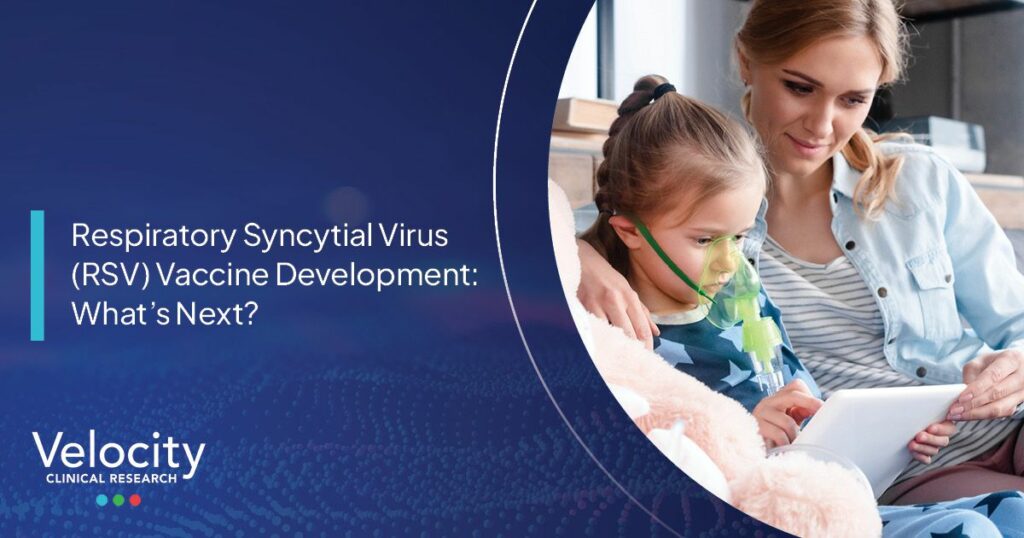Respiratory syncytial (sin-sish-ul) virus, or RSV (also known as human orthopneumovirus), is a virus that affects the lungs and airways. Even if you haven’t heard of RSV, you’ve likely been infected with it. Almost 90% of children are infected with RSV before they are two years old.
RSV is the leading cause of pneumonia and bronchiolitis in infants in the United States. For most people, RSV causes upper respiratory infection and mild, cold-like symptoms (e.g., congestion, low-grade fever). However, RSV can cause severe, life-threatening lower respiratory infections, such as pneumonia or bronchiolitis, and is particularly dangerous for seniors, infants, and people with weakened immune systems.
RSV Transmission: How it Spreads
RSV is highly contagious, and generally spreads quickly during colder seasons. The timing and severity of RSV circulation varies from year to year.
Like the flu virus, RSV can spread through airborne droplets that are created by coughing, sneezing, and even talking. The virus can also survive for hours when it reaches a hard surface, such as a door handle, countertop, bottle, or smartphone.
Physical distancing, wearing a mask, washing your hands, and not touching your face can help lower your risk of RSV infection in settings where you may be exposed. In fact, though we can’t see the full picture yet, it’s likely that the spread of RSV and influenza was drastically reduced in 2020/2021 because of physical distancing, masking, intensified cleaning protocols, and other interventions related to slowing the spread of COVID-19.
Without those interventions in place, some are predicting relatively large RSV and/or influenza outbreaks within the next few years. Daycares, schools, and nursing homes could be affected disproportionately.
Current Treatment Methods for RSV
For most healthy adults and infants, RSV infections go away on their own within two weeks. Over-the-counter fever reducers and pain relievers can help relieve symptoms, and drinking fluids can help prevent dehydration.
Treatment for Serious RSV Infections
RSV can cause more severe infections such as bronchiolitis (inflammation of the small airways in the lung) and pneumonia (infection of the lungs). For some people with RSV infection, especially older adults and infants, hospitalization may be needed if they are having trouble breathing or are dehydrated. In the most severe cases, additional oxygen or intubation with mechanical ventilation may be required.
Who is at Risk for RSV Complications?
Infants, older adults and adults with chronic medical conditions are more likely to develop severe RSV infection and require hospitalization.
RSV Prevention: Is There a Vaccine for RSV?
There are a few FDA-approved vaccines for RSV for infants and those 60 and older. Additionally, many promising vaccine candidates are currently in clinical trials to expand eligible age groups to save many lives and prevent a significant number of hospitalizations.
Currently Approved Medications for RSV
An approved medication called palivizumab (brand name Synagis) is used to help protect premature infants and young children with certain heart and lung conditions. Palivizumab is given as a series of monthly injections during RSV season.
Clinical Trials and RSV Vaccine Progress
Velocity has supported RSV vaccine studies for more than a decade, and frequently conducts RSV vaccine studies for children, seniors, and even pregnant women. (Influenza and pertussis vaccines are recommended for most pregnant women, in part to help transfer protection to newborns. Scientists are assessing whether vaccinating a mother with an investigational RSV vaccine can transfer protection to developing babies.)
The remarkable rise of mRNA vaccines developed for COVID-19 may also create some headway in the development of mRNA RSV vaccines. The clinical trials and widespread use of the mRNA platform means researchers now have extensive evidence of how safe and effective mRNA vaccines could be in the fight against other diseases. (As of this writing [July 2021], Velocity is enrolling participants into mRNA vaccine clinical trials for RSV.)
The COVID-19 pandemic has been a tragic and strenuous journey for humankind. But there is hope that what we’ve learned may accelerate our journey toward a new class of vaccine (and therapeutic) technology that could save millions of lives in the future.
More Information and References on RSV
Centers for Disease Control and Prevention (CDC): https://www.cdc.gov/rsv/index.html
CDC, Infants and Young Children: https://www.cdc.gov/rsv/high-risk/infants-young-children.html
CDC, Seniors: https://www.cdc.gov/rsv/high-risk/older-adults.html
National Institute of Allergy and Infectious Diseases: https://www.niaid.nih.gov/diseases-conditions/respiratory-syncytial-virus-rsv
Current and Upcoming RSV Vaccine Clinical Studies
Velocity frequently conducts RSV vaccine studies for children, seniors, and even pregnant women across the U.S. and Europe. If you’re interested in learning more about or participating in an RSV vaccine trial with Velocity, visit our find a clinical trial page to speak with a recruitment specialist.
Note: The original version of this article stated that there were no approved RSV vaccines in the U.S. This has been updated to reflect recent FDA-approvals of RSV vaccines.

